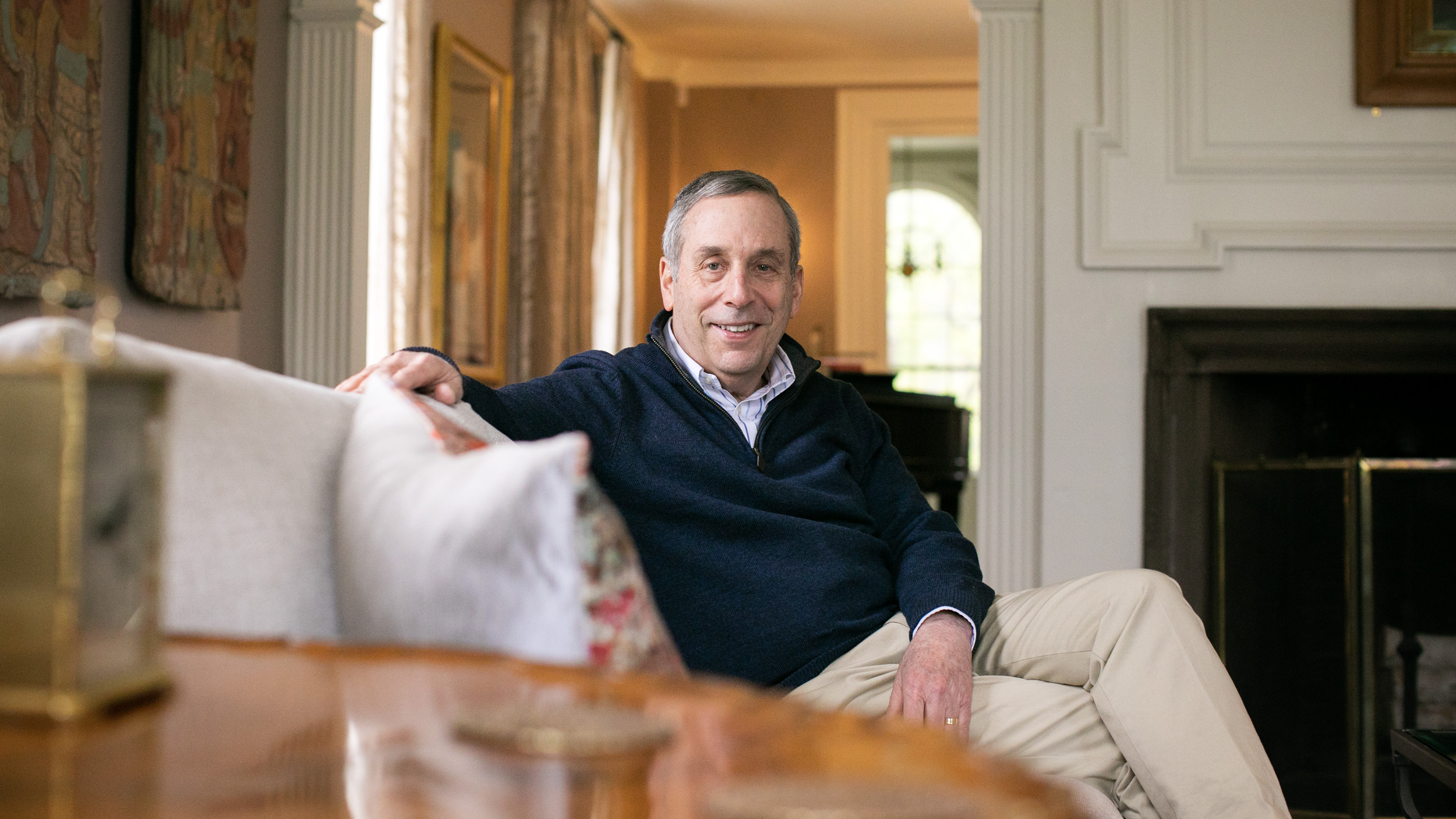
Photos by Stephanie Mitchell/Harvard Staff Photographer
‘I realized that I couldn’t say no — not because of personal ambition, but given the moment.’
Inspired by his mother, Larry Bacow decided he wasn’t done being a leader
Part of the Experience series
Leaders at Harvard in and out of the classroom tell their stories in the Experience series.
Larry Bacow, Harvard’s 29th president, will step down at the end of June after five years on the job. Bacow’s well-honed leadership skills — he served on the Harvard Corporation, as president of Tufts University, and as chancellor at MIT — proved indispensable amid national polarization, public questioning of the role of higher education in society, and, most critically, the profound disruption of the pandemic.
Bacow grew up in Pontiac, Michigan, the son of Jewish immigrants intimately familiar with the horrors of the Holocaust, and like his father, a lawyer, became an Eagle Scout. He built radios from kits, and spent hours reading about science and technology in Popular Science and Scientific American, laying the groundwork for his undergraduate education at MIT. Throughout his life, he has been deeply influenced by the experiences that led his family to emigrate from Europe, particularly those of his mother, who survived three years in Nazi concentration camps.
Bacow sat with the Gazette to share memories and lessons from his early life and his career as a scholar and a leader in higher education. The interview has been edited for clarity and length.
You’ve spoken and written about your parents, especially your mother, Ruth Wertheim, who survived Auschwitz. How did you learn their stories?
My sister and I knew about my mother’s experience. It had been discussed — not in depth — but we knew about it, in part because my mother had almost no relatives. She had an aunt and uncle who had left Germany in ’36 and she lived with them when she finally made it to the U.S. She got out of Germany after the war on the second Liberty Ship — troop ships that brought refugees from Europe. When I was growing up, if there was a TV show about the Holocaust, we’d either change the channel or my mother would leave the room.
Keep in mind that Auschwitz was liberated on Jan. 27, 1945, and I was born in 1951. That’s just six years later. By the time I was 3 or 4, my mother wasn’t 10 years out of Auschwitz, so it was still very fresh in her mind. My father’s story — he was born in Minsk and came here as a child to escape violence there — was not that difficult to talk about, but my mother did not really start sharing her story in depth until she had a heart attack. I think she realized her own vulnerability and that she wasn’t going to be around forever.
Last September, you visited Londorf, your mother’s hometown in Germany. How did that feel to you? Was it a homecoming of sorts?
It was far from that. I had been to Londorf twice before, the first time with my parents when I was about 13 or 14. We went to Israel and then we went to Europe and spent one day in Germany so my mother could see her lawyer in Frankfurt. He was attempting to get reparations for the loss of my mother’s family home, which had been confiscated by the Germans. We spent a few hours in Londorf and that was not a pleasant experience. My mother had connected with a childhood friend, Otto, who lived next door to my grandparents and who had been very kind to my mother’s family before they were transported to camps. At that point, everybody was on rations, but Jews were on half rations and Otto’s family shared what they had with my mother’s family. Londorf was about an hour from Frankfurt, so we went to Frankfurt and then stopped off so that my mother could see Otto. I remember they were talking, standing on the street, and there was this man at a second floor window who kept pulling the curtain back and looking down. I thought it was odd, but when my mother saw him she said, “We have to get out of here.” He was the Nazi who fingered all of the Jews in Londorf. This was 1964, less than 20 years later.
The second time I went to Londorf was in 1994. I was on sabbatical in the Economics Department at the University of Amsterdam. My mother died on Jan. 27, the anniversary of the liberation of Auschwitz, and we went home for her funeral. We came back to Amsterdam and my sister came over about six or eight weeks later and we took a trip to Londorf. Otto was still there and he had asked the woman who was living in my mother’s house if we could visit. We were standing in the vestibule and she seemed very uncomfortable. She was an elderly woman, so I asked Otto how long she had lived there and he said over 50 years. I knew that the confiscated houses of Jews were given to the Nazis and their sympathizers, so we got out of there immediately.
Until recently, Londorf had never done anything to recognize the Jews who had passed away. There were 15 Jewish families that traced their roots in Londorf for hundreds of years. Londorf had erected a monument for all of its residents who had died in World War II, but none of the Jewish residents were listed. That’s how it came to be that I went to Londorf in September, when the town decided to honor its Jewish citizens who died in the Holocaust. My sister, my wife, Adele, and our children attended. We were the only descendants of the only survivor of those transported from Londorf on Sept. 14, 1942.
Was that when the Jewish population was sent to Auschwitz?
Yes, though most did not go to Auschwitz directly; most went to Theresienstadt. Some died in Theresienstadt, including my great-grandfather. The survivors were sent to Auschwitz. There were seven villages, including Londorf, that collectively made up the area known as Rabenau. Of the approximately 120 Jews from Rabenau transported on that day, my mother was the only one who survived.
How old was she?
She was 15 when she went into the camps, 18 when she was liberated. She was in Auschwitz only for about six weeks. If you were young enough and still well enough to work, they sent you to a slave labor camp, where you were forced to work on behalf of the Nazis. Many of those who worked in the slave labor camps died of starvation, disease, and sometimes, when the Nazis didn’t get what they wanted from them, they killed them.
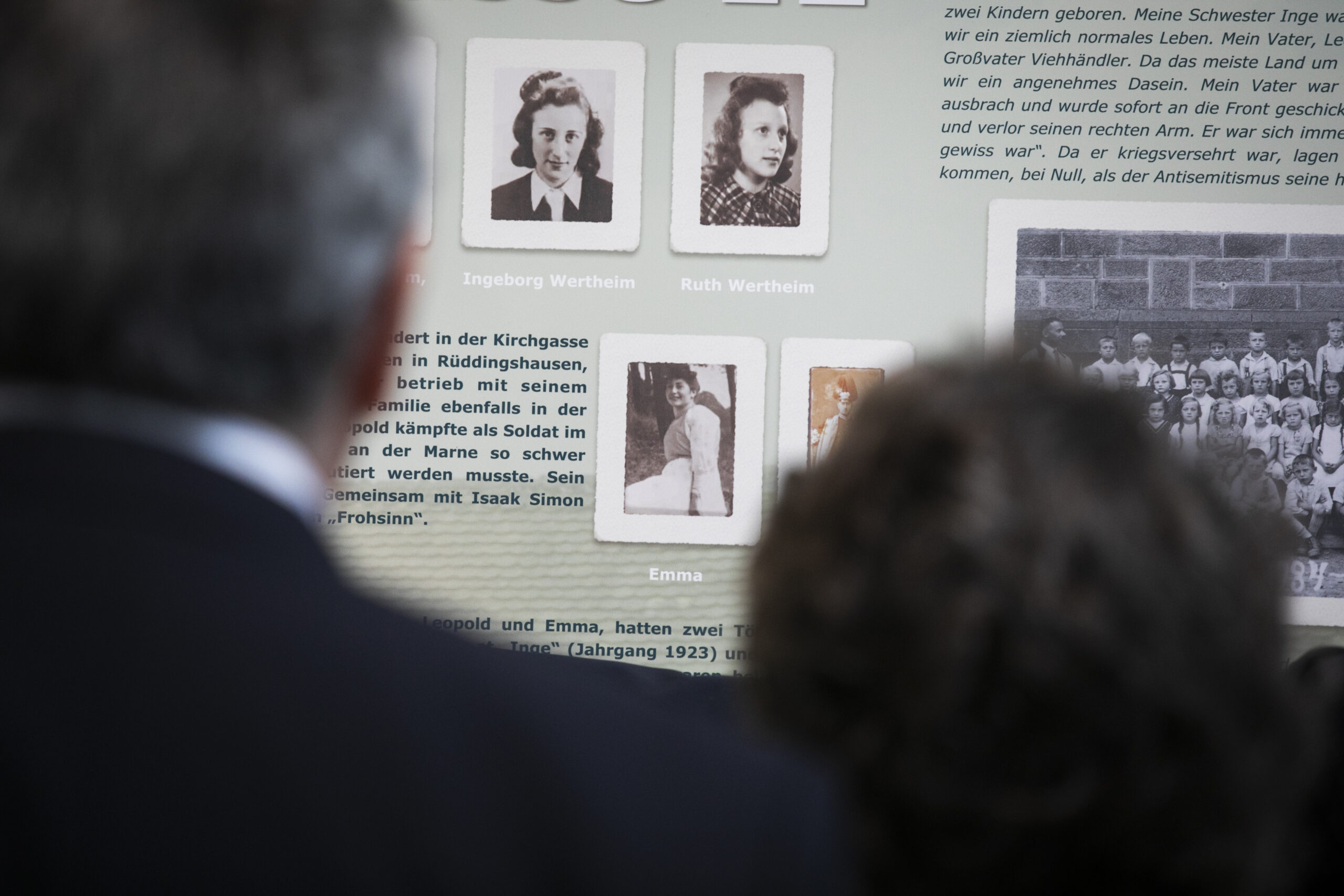
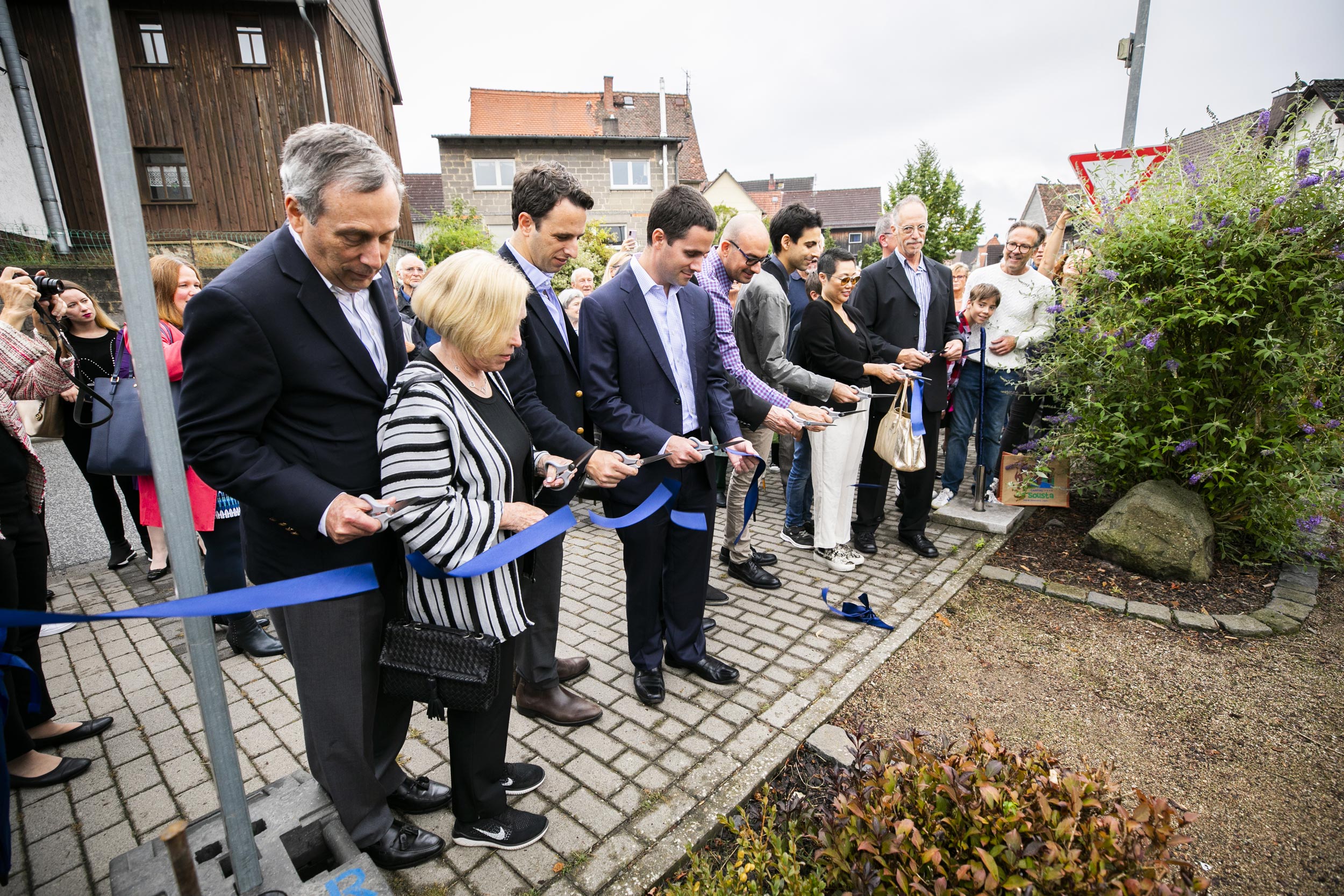
A photo of Larry Bacow’s mother, Ruth Wertheim, who survived Auschwitz, is displayed in her hometown of Londorf, Germany, where Bacow and other descendants of Holocaust victims cut ribbon on a memorial that was unveiled in September.
‘Total serendipity’
You wanted to follow in your father’s footsteps and become a lawyer, but instead spent decades teaching and conducting research on environmental economics and policy. When did you change your mind?
I graduated a year early from MIT, but by the time I figured out that I could graduate, it was too late to apply to law school. So I went to a faculty member who had become my mentor, Bob Solow, and asked him for advice. Bob mentioned a new public policy program at the Kennedy School that he thought I might like, though I was past the admissions deadline for that as well. He called a friend, Tom Schelling, who was running the program at the time, and said something to the effect of, “Take this kid.” That’s how I wound up at the Kennedy School as a 20-year-old graduate student in 1972. I applied to Law School from the Kennedy School, got accepted, and wound up in the joint degree program between the Kennedy School and the Law School.
I worked for a law firm the summer after my second year of Law School. It was a great firm, they did exactly what I thought I wanted to do, which was at the intersection of law and economics-regulatory practice and antitrust practice. But I realized at that point that I wasn’t cut out to practice law.
So, you’re going into your third year of Law School and realizing that you’re on the wrong path?
The law firm made me an offer and I turned it down. It’s my third year, I’m not interviewing, my friends are asking what I’m going to do. “I’ll figure it out,” I tell them. Then I realized that I’d taken all the coursework for a Ph.D. in public policy. I thought I’d take my general exams in the fall of my third year of Law School, write my dissertation proposal in the spring of my third year of Law School, and then see if I could write a dissertation in a year — it turned out to take a year and two summers.
I had met Adele on my first day of Law School — we were fixed up by our roommates. She had just graduated from Wellesley and had a job as a researcher at a consulting firm in Boston. The summer after my second year of Law School, we got married and, that fall, she started the master’s in city planning program at MIT. By the time she’d graduated and I’d finished my dissertation, it was the start of the Carter administration and Adele and I thought we’d go to Washington and both work in government.
But I had an opportunity to fill in for somebody who was on leave from MIT for two years. I was offered a two-year, non-tenure-track, terminal appointment — not the highest rung on the academic ladder. It seemed like a reasonable thing to do. Adele and I didn’t have to move, MIT was my alma mater, and my mentor, Bob Solow, encouraged me to do it. So I went to MIT and two years turned into 24.
“A piece of advice I give to new presidents is to always do the right thing. It’s usually not that difficult to figure out, but often excruciatingly difficult to do.”
It’s graduation season. Do you have advice for students who are trying to figure out what’s next?
It’s a mistake to overplan. It’s fine to think about what you want to do and start out doing that, but don’t put blinders on. Careers are often a series of fortuitous accidents. You can really only know your career on the day you retire, when you look back and say, “That was my career. It all makes sense.” I tell students that a little anxiety is helpful, and to keep an open mind while they figure out what they like and don’t like. Sometimes the most valuable information you can get out of a job is that you don’t like doing it. My summer working for a law firm is a good example.
I also tell students that when confronted with a career choice, ask yourself three questions: Is the job worth doing? Not every job is. The second question is: Are you going to grow and learn in the job? If not, eventually you’ll get bored. The third question is: Are you going to like and respect the people you work with? Life is too short to work with people you neither like nor respect. Finally, I tell them that there are very few irreversible decisions in life, and if you don’t like what you are doing, you can always try something else.
So your career in academia wasn’t planned, but rather a result of serendipity?
Total serendipity.
When did higher ed become the main path?
I realized during my two years teaching at MIT that I really enjoyed what I was doing. I love to teach, I love being around smart people — my students and colleagues. I became interested in a set of questions, which became the basis for a lifetime of research. There’s a tremendous amount of intellectual freedom, a lot of flexibility in how you spend your time. And I was fortunate — after two years, the faculty member whom I was filling in for decided not to come back. My department did a search and I got hired. But I had never anticipated getting a Ph.D., never anticipated being an academic. Again, I thought I was going to be a lawyer.
You started as Tufts president in September 2001. After you stepped down, in 2011, you became a Fellow of the Harvard Corporation. Did you know when you were leaving Tufts that you wanted some sort of “after experience” at Harvard?
I didn’t want to run anything. I was 59 and I was done. I had people calling me asking if I was interested in other university presidencies and I didn’t go near any of them. But I had gotten to know Drew Faust quite well during the financial crisis — there are certain things you can only talk to a fellow president about and we talked a lot. I also knew a number of the other members of the Corporation from my time at Tufts and at MIT. When approached about possibly joining the Corporation, I thought it would be a good way to be helpful to an institution that has played a very large role in my life, and a good way to stay involved in issues of higher education at a high level and at a very consequential place. Plus, it’s a great honor to be asked to join the Corporation.
‘This was not a time to sit on the sidelines’
When did you realize that the search to find Drew’s replacement was turning toward you?
Very late in the process. I had been asked earlier whether or not I was interested in being a candidate and my initial response was no. And then Charlottesville happened. White supremacists marching in the streets, saying, “Blood and soil, Jews will not replace us.” “Blood and soil” was a slogan used by the Nazis, so this hit close to home. Then the president of the United States stood up and said there were “very fine people on both sides.” At the same time, higher education more broadly was starting to come under attack. I concluded that this was not a time to sit on the sidelines. I had no aspiration to be president of Harvard, but I realized that I couldn’t say no — not because of personal ambition, but given the moment.
As you mentioned, the value of a college education was being questioned. Have we made progress since then?
During the pandemic, I think people came to realize that research institutions like ours have much to contribute through their scholarship to the nation and to the world. Of the three vaccines that were in use in the United States, two had their origins to some extent in Harvard Medical School laboratories.
Moderna and Johnson & Johnson.
Right. The public loves the research mission of higher education because it produces discoveries that save lives, create jobs, and help to drive the economy. That’s all good, but the public is skeptical about what we do at the undergraduate level. People think we’re too expensive, people think that we’re elite, people think that we don’t promote freedom of speech, I could go on. Most of our critics tend to look at colleges and universities through the lens of undergraduate education and I think people are still highly critical of that — and of institutions like ours — today.
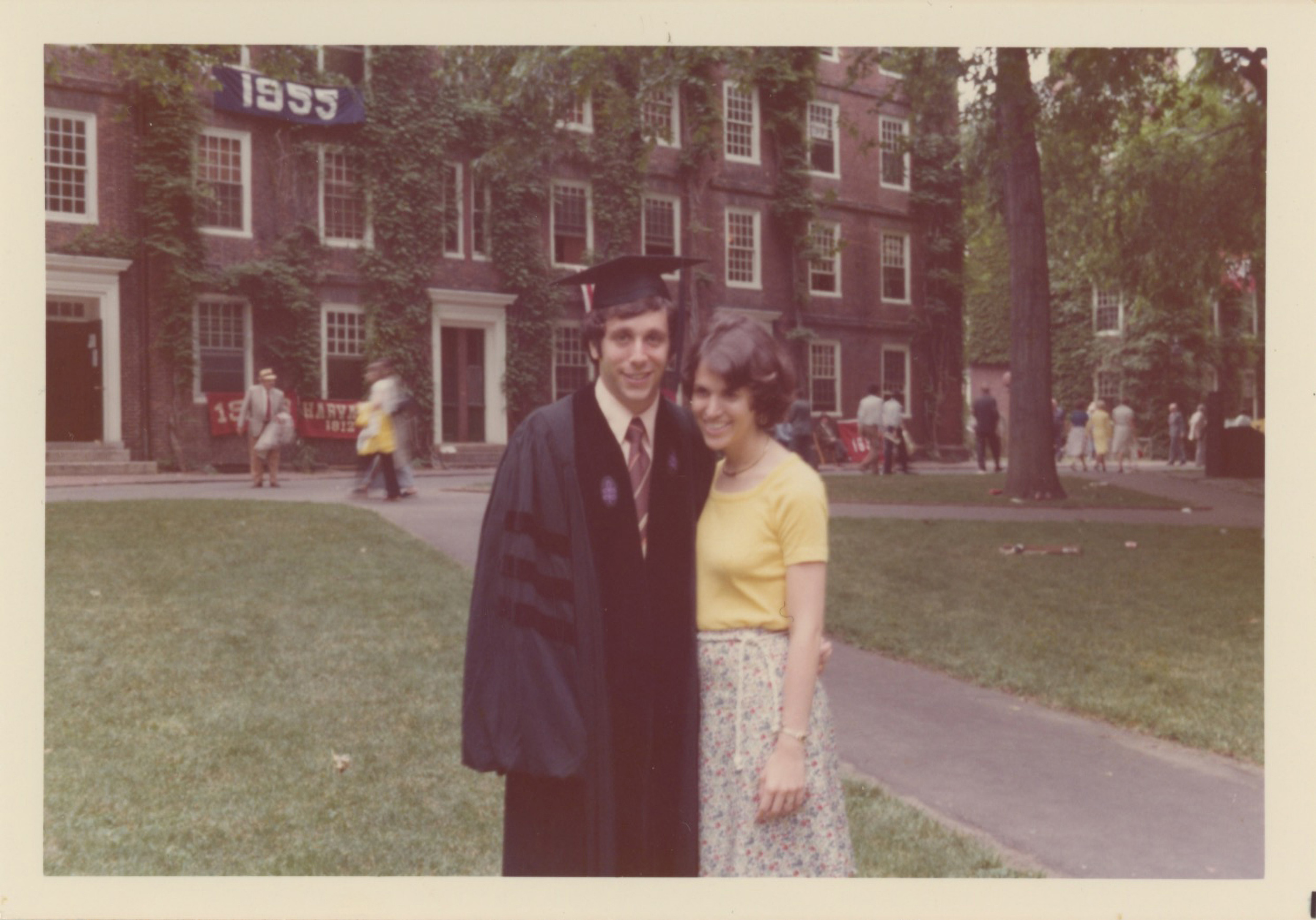
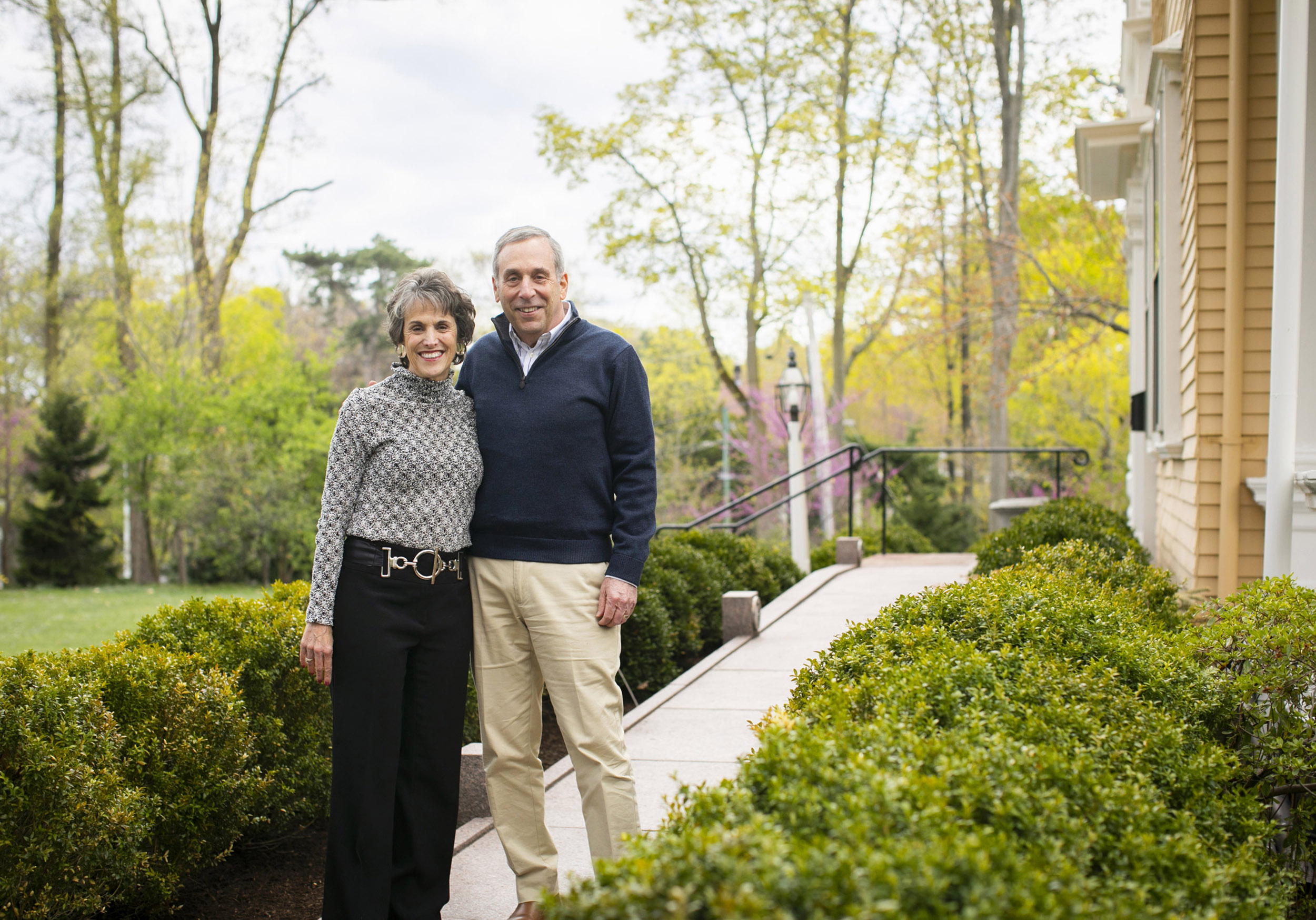
Larry and Adele Bacow in 1976 and today.
You were less than two years on the job when COVID hit. It wasn’t something anyone could plan for.
I always tell new university presidents that the biggest challenges they will face could not have been anticipated on the day they took the job. I was fortunate because I had a spectacular team that I inherited from Drew. If I knew I was going to have a pandemic, I could not have asked for a better-prepared provost than Alan Garber, a physician and an economist whose expertise is in health policy and who had written about pandemics in his scholarly life. I could not have asked for a better executive vice president than Katie Lapp, who had helped steer New York City through 9/11 and was deeply steeped in crisis management. Beyond that, one of the wonderful things about being president of Harvard is that it’s difficult to identify any area of scholarship that is not represented at the very highest level. I could draw upon some of the world’s foremost experts in epidemiology, virology, infectious disease, and public health. Under Alan’s leadership, we organized a team of our own experts to provide input to our decision-making.
Was there a most difficult decision?
The decision to send students home wasn’t actually that difficult. But I knew we were going to be criticized for it as premature and unnecessary because people had said that young people were not at risk and it was costly in a variety of ways. The University of Washington sent everybody home because they had had an outbreak on their campus. It was one of the first hotspots in the United States. We were the first major university — Amherst did it the same day that we did — who made the decision to send students home without having experienced any cases on campus. There were very few cases in Massachusetts at the time, but the numbers were doubling almost daily. You did not have to be brilliant to recognize the consequences of exponential growth.
When I say it wasn’t a difficult decision, let me back up. A piece of advice I give to new presidents is to always do the right thing. It’s usually not that difficult to figure out, but often excruciatingly difficult to do. I was pretty convinced that sending students home was the right thing to do because if we sent them home prematurely, the cost of being wrong was relatively modest. We would have inconvenienced a lot of people, squandered a lot of resources, and, as an institution, we probably would have taken a reputational hit. But if we kept students here and we were wrong, it was likely that some people would die. When you weigh those two, it’s not a difficult decision. In retrospect, we were right, because, as we suspected, the number of cases in Massachusetts skyrocketed in a very short period of time. The pandemic and its consequences turned out to be far worse than many had anticipated.
Where are we now?
A lot of people have said that we’re through with the pandemic, but the pandemic is not through with us. There are still almost 1,000 new cases a week in Massachusetts and people are still dying. It’s still a public health issue and it could become a bigger public health issue if the virus were to mutate and our ability to protect people through vaccines declined. Time will tell but I am hopeful the pandemic will soon become a thing of the past.
Economically, Harvard has recovered. In fact, the University is probably stronger today than it was going into the pandemic. We were helped by healthy markets, by very loyal alumni who have been generous to us, and by the fact that we did a retirement program to pare costs when times looked tough.
And there have been some silver linings. Faculty learned how to use technology to teach in new ways, a process that might have otherwise taken years. We also learned that not everybody needs to be on campus to do their work efficiently. That’s been helpful to people with small children at home and to those who have eldercare responsibilities. We learned that we can parachute people into a classroom digitally — at effectively zero cost — to enhance learning through guest lecturers who don’t have to get on an airplane in order to participate. We learned that far more students are willing to go to office hours online than are willing to show up at faculty members’ offices.
I would not have wished the pandemic on anybody, but we learned a lot about how to do things differently.
During your presidency, climate change has been a major point of emphasis. When in your career did you first start to think about it as a global crisis?
We had a project at MIT called the Alliance for Global Sustainability, which was a partnership between the Swiss Federal Institute of Technology, the University of Tokyo, and MIT. AGS, as we called it, was created in the mid-1990s, around the time I became chair of the faculty. Industry was deeply involved from all three countries. The idea was to collectively examine, understand, and generate policies to deal with major environmental issues of the time, including climate change. Once I became chancellor, I took on responsibility for representing MIT in the alliance. We had a group of faculty, largely economists and atmospheric chemists, who had built a very sophisticated model to estimate the likely long-term impacts and consequences of climate change under a variety of assumptions. I was not involved in building that model or looking at the policy implications, but a lot of my colleagues were. So, we were taking climate change seriously in the early ’90s, and there were faculty, largely on the science side, who were engaged far earlier than that.
Has Harvard done enough in this area?
There’s never enough, given the magnitude of the problem. The issue these days is less whether academic institutions are doing enough and more whether government is doing enough. Ironically, right now, industry is often doing more on its own than government is willing to do. Unfortunately, the issue has become politicized in this country to a far larger extent than it has in others, which has made it difficult to make progress on the policy front.
“The experience that students have today is very different from what I had as an undergraduate when I arrived in Cambridge in 1969.”
Other themes of your presidency have included a focus on immigration and a commitment to addressing discrimination past and present, including through the Legacy of Slavery report. Did you start the job with a firm sense that these issues would be priorities?
Again, challenges present themselves and you have to meet them. I knew that DACA and immigration were going to be important when I took the job, but I didn’t know that in my second year, we’d have a freshman who would be turned away at the border — at Logan Airport — basically because of his ethnicity. That offended me, so we went to bat for Ismail Ajjawi. I never anticipated that the day after we announced we were going to continue to be all remote in the fall, the federal government would announce that any foreign student at an institution that was teaching remotely had to leave the country. I was greatly disturbed by that. I never anticipated that we would have a humanitarian crisis in Afghanistan, and now, Ukraine, where there would be hundreds of thousands of refugees seeking to escape an extraordinarily difficult situation. But because of the experience of my parents, I felt that if we could do something, we should.
You cannot lead unless your leadership is grounded in values that are not just personal but also represent the values of the institution. And I always say that Harvard has a special responsibility to engage in all the major challenges confronting society, in part because we have the capacity, in part because of the important role that we played, literally, in helping this country come into being, in part because of the stature that we enjoy in the higher education community worldwide, and also because in many cases this country looks to us for leadership.
With the Legacy of Slavery report, was there a sense of initiating a true reckoning with the early history of Harvard and the region? One of the clear takeaways is colonial New England’s deep culpability in slavery and the benefits of slavery.
Many of us forget that slavery was legal in Massachusetts until 1783, when the state Constitution was adopted. At the time, Harvard was already 147 years old. The New England economy benefited enormously from the institution of slavery. We created markets that made slavery more profitable in the South. We bought their cheap cotton and increased its value by turning it into textiles, which were sold not just here but abroad. New England banks financed the slave trade. As New England benefited, so did Harvard. I get way too much credit for creating the Presidential Committee on the Legacy of Slavery. Though I did give them their mandate, it started much earlier with Sven Beckert, a faculty member in the History Department, who was interested in what Brown University had done in interrogating their own history of slavery. He conducted a seminar in which students worked to better understand our connection to the institution of slavery. Drew picked up on that, and another group took a deeper look that resulted in the recognition that enslaved people worked at Wadsworth House. When I became president, it was clear that the full story had not been told and that it needed to be told if we were to fulfill our commitment to veritas, the truth.
What do you see as the University’s main priorities going forward?
You should ask Claudine Gay. Each president tries to give voice to the interests and priorities of the faculty, and the University’s priorities should be an integration of the interests of the faculty. But there are times you have to put a stake in the ground and say, “This is where we’re going.” Recognizing the priorities of faculty is not always easy, because every faculty member has a point of view. I’ve already said that I think the University ought to be involved in the great challenges of the day, whether it’s climate change, K-12 education, inequality, the development of AI and its impact on our future, racial justice, the future of democracy — I could go on. I also think that it’s important for us to be able to — and I think this is the job of any academic leader — look over the intellectual horizon and identify fields, disciplines that are evolving into what’s going to be important in 20, 30, 40 years, and then say, “We’re going to invest in those areas.” But every president makes their own decisions and Claudine and her successors will have their own views.
As far as students of the future, do you see the academic experience changing in any particular way?
The only constant at the University is change. The experience that students have today is very different from what I had as an undergraduate when I arrived in Cambridge in 1969. For example, Harvard and Radcliffe are now one. We have achieved gender parity among students enrolled at the College. We are far more ethnically diverse than we were back then. Mental health challenges loom much larger. As students, we were very concerned about a lot of issues, but climate change was not one of them. We were concerned about the Vietnam War, the fight for Civil Rights and women’s rights, among others. Harvard’s curriculum has evolved. Our Schools have evolved. Our campus has evolved. There’s this view that universities never change, but if that were true we would not have survived and thrived for almost 400 years. If you look around, universities are among the most ancient, enduring institutions in the world, and in many cases, the only reason that they have made it this far is because they’ve adapted over time.
















